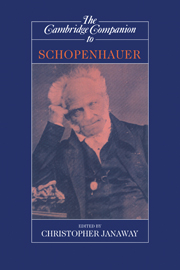Book contents
- Frontmatter
- Introduction
- 1 Schopenhauer on the Self
- 2 Schopenhauer and Knowledge
- 3 The Fourfold Root
- 4 Schopenhauer, Kant, and the Methods of Philosophy
- 5 Will and Nature
- 6 The Influences of Eastern Thought on Schopenhauer’s Doctrine of the Thing-in-Itself
- 7 Ideas and Imagination
- 8 Schopenhauer’s Narrower Sense of Morality
- 9 Schopenhauer on Death
- 10 Schopenhauer’s Pessimism
- 11 Nietzsche, Schopenhauer, and Dionysus
- 12 Schopenhauer, Will, and the Unconscious
- 13 Schopenhauer and Wittgenstein
- Bibliography
- Index
9 - Schopenhauer on Death
Published online by Cambridge University Press: 28 May 2006
- Frontmatter
- Introduction
- 1 Schopenhauer on the Self
- 2 Schopenhauer and Knowledge
- 3 The Fourfold Root
- 4 Schopenhauer, Kant, and the Methods of Philosophy
- 5 Will and Nature
- 6 The Influences of Eastern Thought on Schopenhauer’s Doctrine of the Thing-in-Itself
- 7 Ideas and Imagination
- 8 Schopenhauer’s Narrower Sense of Morality
- 9 Schopenhauer on Death
- 10 Schopenhauer’s Pessimism
- 11 Nietzsche, Schopenhauer, and Dionysus
- 12 Schopenhauer, Will, and the Unconscious
- 13 Schopenhauer and Wittgenstein
- Bibliography
- Index
Summary
We abhor death, and as nature does not lie and the fear of death is the voice of nature, there must yet be some reason for this.
SchopenhauerON DEATH AND LIFE AS DYING
The concept of death is a fundamental adjunct of Schopenhauer's metaphysics of appearance and Will. Schopenhauer interprets death as the aim and purpose of life. He maintains that to live is to suffer, that the triumph of death is inevitable, and that existence is a constant dying. Yet Schopenhauer also insists that death is the denial of the individual will or will-to-live; that birth and death as events in the phenomenal world are alike unreal; that death is not complete annihilation; and that suicide, though not morally objectionable, is philosophically pointless because it affirms the will-to-live. The paradoxes in Schopenhauer's reflections on the nature of death must be understood in order to appreciate what he means by the empirical will in its relation to Will as thing-in-itself in his unique brand of post-Kantian idealism.
- Type
- Chapter
- Information
- The Cambridge Companion to Schopenhauer , pp. 293 - 317Publisher: Cambridge University PressPrint publication year: 1999
- 10
- Cited by

